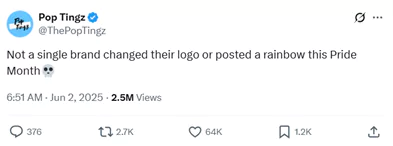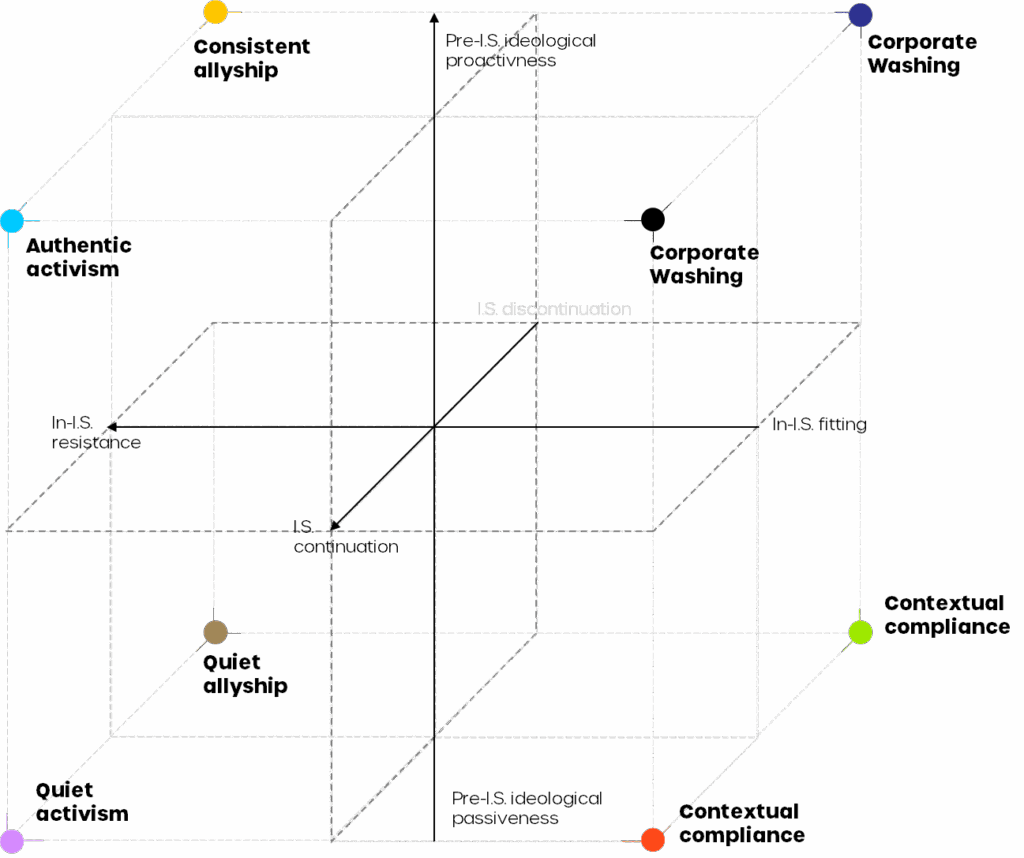
“Sashay Away!” How Corporate Silence During Pride 2025 Could Alienate Brands from the LGBTQ+ Community
The onset of Pride Month 2025 has divided the corporate landscape into two distinct camps: brands steadfastly committed to LGBTQ+ communities and those realigning their stance to accommodate the political pressures of the Trump administration. Amid this shifting terrain, LGBTQ+ activists and community members have identified a critical moment to scrutinize corporate authenticity, differentiating true allies from opportunistic brands retreating under political adversity. This scenario prompts crucial questions: How have these responses resonated with the LGBTQ+ community? What implications might this moment have for future corporate credibility and reputation-building efforts?

1.
Conditional Allyship: revisiting the corporate-LGBTQ+ dynamic
Regardless of sincerity, contemporary Western corporations have consistently sought to resonate with underrepresented social groups, a trend underscored by Kantar’s 2024 Brand Inclusion Index, which found that 65% of consumers perceive brands as actively pursuing diversity and inclusion[1]. This perception aligns with market realities—the global Diversity and Inclusion (D&I) sector was valued at $14.1 billion in 2024 and is projected to nearly double, reaching $27.1 billion by 2030, reflecting an annual growth rate of 11.4%[2]. Clearly, social inclusion has become commercially strategic.
Scholars outline several corporate motivations driving this surge:
- Financial growth through sales increase: Brands perceived as inclusive tend to gain significant benefits, both in terms of consumer engagement and overall brand performance. Inclusive perception positively influences consumer attitudes, purchase intentions, and brand engagement.[3] Recent large-scale research, including a global study led by the Unstereotype Alliance and Oxford University’s Saïd Business School, analyzed 392 brands across 58 countries and found that inclusive brands see a 3.5% to 5% higher uplift in short-term sales compared to less inclusive counterparts, and a 16% higher uplift in long-term sales performance.[4]
- Widened talent pools, improved retention, and outperforming workforce: Studies across sectors highlight that inclusive recruitment practices and workplace policies not only attract a broader and more diverse talent pool but also enhance employer attractiveness and organizational loyalty. This advantage is not only reflected in talent attraction and retention, but also in the work performed by the teams: diverse teams have been shown to outperform homogenous teams.[5]
- Peer pressure & herd behavior: Sometimes diversity initiatives result from imitation rather than strategic calculation. Corporations often replicate their competitors’ behavior simply because it is perceived as normative within the market, even if clear strategic benefits are not articulated[6].
- Increased creativity and innovation: Inclusive environments foster diverse perspectives, enhancing problem-solving capabilities and leading to improved innovation and decision-making quality[7].
- Regulatory compliance and social expectations: Many firms adopt inclusive policies not proactively, but as a defensive measure to comply with societal norms or legal standards, maintaining their “social license to operate” and mitigating reputational risk[8].
- Leadership Personal Experiences: Occasionally, leaders’ personal backgrounds and early experiences with marginalization inform their commitment to social responsibility initiatives. However, this is relatively rare compared to strategic motivations aligned with broader organizational culture and ethical considerations[9].
Given these factors, it is unsurprising that corporate enthusiasm for diversity, equity, and inclusion (DEI) initiatives is substantial. Nevertheless, from the LGBTQ+ community’s viewpoint, corporate inclusion is met with varied responses: enthusiastic acceptance, pragmatic tolerance, or outright rejection. Central to this varied reception is the authenticity of corporate intentions and actions.
Academic research highlights that LGBTQ+ community members evaluate corporate allyship primarily on authenticity, transparency, and the depth of commitment to genuine advocacy. Corporations perceived as genuinely supporting rights beyond superficial gestures are typically welcomed. However, skepticism and criticism intensify when companies’ initiatives appear performative or profit-driven—phenomena often described as “pinkwashing” or “homocapitalism.” Indeed, research from Pride events, such as those in Hong Kong, reveals tension between corporate-sponsored celebrations—which can reinforce neoliberal values—and grassroots, intersectional movements, highlighting corporate exploitation or dilution of authentic LGBTQ+ advocacy.[10]
Statistics underline this nuanced skepticism: 68% of LGBTQ American adults believe corporate Pride participation is profit-driven rather than genuinely supportive. Further, 35% feel companies participate out of external pressure, while only 16% perceive genuine celebratory motivations. Despite this skepticism, 58% of LGBTQ individuals still expect corporations to advocate for LGBTQIA+ rights, and nearly half (49%) accept even half-hearted corporate involvement, although another 48% would prefer no corporate effort rather than insincere participation. Notably, transparency remains critical—71% of LGBTQ+ individuals expect clear communication regarding corporate Pride initiatives.[11]
Illustrative of this complex stance is influencer Matt Bernstein’s response to Target’s 2023 Pride collection: “Rainbow capitalism isn’t going to save us, and ultimately, Target’s goal is just to be as profitable as possible. That being said, I do think it’s a little cool that one of the largest retailers in the world is giving, at the very least, a large platform to messaging like this.” Bernstein’s commentary encapsulates the community’s pragmatic yet critical stance towards corporate activism, balancing skepticism about corporate motives with recognition of potential community benefits.
Thus, the relationship between corporations and the LGBTQ+ community is inherently fragile and conditional—based not on shared values but intersecting interests and transactional exchanges. It is a cooperation vulnerable to breakdown if perceived mutual benefits fade. Recent political developments, especially under the Trump administration, have underscored these vulnerabilities and merit a closer examination of how these changes influence the future trajectory of corporate-LGBTQ+ allyship.
2.
“I feel very attacked”: LGBTQ+ community experiences amid recent political changes
For those disconnected from the LGBTQ+ scene, recent months might seem uneventful. However, for LGBTQ+ communities, this period has felt like a targeted assault on their rights and security. To illustrate this cumulative effect, consider some of the recent administrative actions:
- Rescinding regulations under Title IX that prohibited discrimination based on sexual orientation and gender identity in educational institutions – removing protections for LGBTQ+ students, potentially leading to increased harassment, discrimination, and exclusion in schools.
- Proposing defunding of LGBTQ+ youth suicide lifeline, threatening to cut off critical mental health support for LGBTQ+ youth, who are at higher risk for suicide and mental health crises.
- Terminating of Diversity, Equity, Inclusion, and Accessibility (DEIA) federal programs, and pressurizing private companies (in and out of the U.S.) to act similarly – undermining efforts to address systemic discrimination in corporate environment,
- Ending data collection on gender identity, critical for tracking hate crimes, disparities, for advancing health research and meeting unmet patient needs.
- Banning transgender individuals serving openly in the U.S. military, marginalizing transgender individuals who have served or wish to serve, denying them the right to serve their country.
- Erasure of “Trans” and “Queer” from historical narrative. More specifically, proposing to remove Harvey Milk’s Name from USNS Harvey Milk, or removing references to “trans” and “queer” from the official Stonewall National Monument website.
- Ceasing to administratively recognize the existence of transgender people, which could lead to the removal of gender-affirming care from federal health programs and the elimination of nonbinary options in federal documentation – with all the legal and practical effects it encompasses.
These administrative changes do not merely affect policy—they amplify societal prejudices and hostility toward LGBTQ+ individuals, exacerbating minority stress[12]. When leadership signals rejection, public attitudes follow[13]. For scale, the increase in hate crimes during first Trump presidency was especially notable in 2016 and 2017, with FBI statistics indicating a 5% jump in 2016 and a 17% increase in 2017 compared to the previous years[14].
Although this only occurs in the United States, these developments reverberate internationally, prompting concern among LGBTQ+ minorities abroad about potential contagion effects[15]. Consequently, LGBTQ+ community’s gaze has therefore turned to those who once claimed to be their allies – and among them are companies.
3.
The sound of silence: Corporate reticence during pride 2025 draws LGBTQ+ community scrutiny
As Pride 2025 begins, corporations once vocal in their LGBTQ+ advocacy have markedly reduced their public engagement. A Gravity Research survey reveals that 39% of corporate leaders intend to decrease Pride-related marketing and involvement, a significant increase from 9% the previous year, with no reported increases in spending[16]. Notable corporations scaling back include Garnier, Target, Mastercard, PepsiCo, Cisco, BMW, NFL, Nissan, Deloitte, Google, Adidas, and Home Depot. This strategic retreat varies from modest budget cuts to complete cessation of DEI initiatives.
This cautious corporate stance aligns with previous research indicating that businesses primarily support LGBTQ+ initiatives for strategic rather than altruistic reasons. With the Trump administration fostering a politically hostile climate toward LGBTQ+ issues, corporations fear reputational or regulatory backlash, prompting their withdrawal.
However, corporate discretion has drawn significant criticism from LGBTQ+ communities, reinforcing existing skepticism about corporate allyship. Online, queer discussions highlight brands perceived as opportunistic, shallow, or inconsistent, now exposed by their retreat under pressure – some influencers dedicate series of videos to expose brands. Social media backlash against these corporations is extensive, with some posts garnering hundreds of thousands of engagements. According to eMarketer, consumer attitudes overwhelmingly favor continued DEI support—77% of consumers express willingness to abandon brands that retreat from diversity commitments, and notably, 40% of Gen Z consumers have already ceased purchases from companies reversing DEI efforts[17].
For some corporations, consequences have already materialized. Target, which publicly reduced its diversity initiatives, faced damaging boycotts beginning in May[18]. Conversely, companies that have steadfastly maintained their diversity commitments, such as Levi’s, Converse, Calvin Klein, Diesel, and Apple, have received robust support and appreciation from LGBTQ+ communities[19].
This critical juncture underscores the potential long-term implications for corporate reputations and relationships with LGBTQ+ audiences. Companies are now compelled to choose between political compliance and principled advocacy, each decision carrying substantial and lasting reputational risks or rewards.
4.
A strategic perspective on the aftermaths of Pride 2025
To understand potential future scenarios for corporate involvement in LGBTQ+ advocacy post-Pride 2025, it is crucial to consider several influencing factors:
- Ideological shift (I.S.) discontinuation vs. continuation: Whether a progressive or conservative political climate prevails after the Trump administration significantly influences corporate strategies. A progressive resurgence may encourage renewed diversity initiatives, whereas sustained conservatism might further discourage corporate engagement in social issues.
- Ideological shift (I.S.) compliance vs. resistance: Companies’ decisions during the Trump administration—whether to maintain, reduce, or abandon inclusivity commitments—may have enduring reputational consequences. Research highlights that people memories, though prone to gradual attenuation (“time-healing effect”), can remain potent, especially when people strongly identify with brands due to their social activism[20].
- Pre-Ideological shift (I.S.) proactiveness vs. passiveness: Pre-Trump corporate engagement levels significantly impact how post-Trump corporate decisions are perceived. Companies that were previously proactive face heightened scrutiny if they retreat, whereas passive followers may encounter less backlash, given lower initial expectations.

To anticipate the reputational outcomes of corporate behaviors following Pride 2’025, a conceptual matrix is proposed. It combines three critical axes—ideological climate shift, continuity of inclusivity commitments, and pre-shift activism—to outline eight potential scenarios. Each scenario includes both the immediate context and future considerations for brand management.
It is important to emphasize that the matrix presented here is speculative, intended primarily as a conceptual framework to help analyze potential reputational outcomes rather than as an empirically validated prediction model.
- 1- Consistent allyship
- Context: The company was proactively inclusive before the conservative shift, maintained its inclusivity stance during the conservative period, and the conservative ideological momentum subsequently declines. This represents the most advantageous scenario, affirming the brand’s genuine allyship and strengthening its reputation as authentically committed to social justice.
- Future considerations: The brand can leverage historical consistency as a key communicative asset, significantly enhancing trust and credibility compared to competitors who wavered under political pressure – this can be a decisive strategic advantage, as LGBTQ+ community is usually skeptical about corporate motivations.
- 2- Authentic activism
- Context: The company proactively supported LGBTQ+ issues before the shift, maintained active support despite a sustained conservative environment, and the conservative pressure continues post-Trump. This scenario demonstrates a brand deeply committed to its values but at risk of alienating broader audience segments due to diverging from mainstream conservative sentiments.
- Future considerations: While authenticity enhances niche loyalty, the brand might lose broader market appeal, becoming more specialized and potentially vulnerable if it eventually capitulates under ongoing conservative pressures, risking classification as hypocritical or opportunistic (“Corporate Washing”).
- 3- Quiet allyship
- Context: The company minimally complied with inclusivity before the conservative shift, maintained low-level commitments during conservatism, and the ideological backlash recedes post-Trump. This scenario is improbable, as it involves passive entities unexpectedly resisting political inertia without a proactive record.
- Future considerations: This scenario is unlikely, therefore considered negligeable.
- 4- Quiet Activism
- Context: The company minimally complied before, maintained minimal inclusivity despite prolonged conservative pressure. The scenario is similarly improbable due to the contradictory nature of passive actors resisting strong ideological inertia.
- Future considerations: This scenario is unlikely, therefore considered negligible.
- 5/6- Corporate Washing
- Context: Companies that proactively championed inclusivity pre-conservative shift but significantly scaled back their commitments during conservative pressures—regardless of subsequent ideological developments—face severe reputational damage. The community perceives such actions as opportunistic betrayals, leading to distrust from both LGBTQ+ communities and conservative segments, who question the brand’s sincerity and consistency.
- Future considerations: Negative consumer memories, especially regarding social values, tend to persist. Brands in this category must anticipate intensive remedial efforts, including potential brand identity rebranding and enhanced CSR signaling to regain lost credibility. Future activism by these brands will likely face skepticism, requiring demonstrable and consistent commitments to rebuild target audience trust.
- 7/8- Contextual compliance
- Context: Brands that previously engaged minimally and further reduced or ceased commitments under conservative pressure, regardless of the ideological shift’s continuity, are less vulnerable to accusations of betrayal. Since these brands never strongly signaled inclusivity, they are viewed as neutral followers rather than opportunists.
- Future considerations: These brands may avoid severe backlash but will also forfeit reputational and engagement advantages typically associated with proactive inclusivity. Remaining passive, these brands risk sustained low audience engagement and limited differentiation in socially-conscious markets.
The complexity and nuance within these scenarios extend beyond binary categorizations. While the matrix offers a conceptual framework, actual audience judgments are often less nuanced and more categorical. Real-world audience behaviors and attitudes—such as continuing purchases or employment choices despite moral disagreements, thresholds for profitable diversity investments, and proportional impacts of corporate activism—further complicate the landscape.
Thus, while theoretical frameworks provide valuable insights, the ultimate test of corporate authenticity and audience response will unfold through tangible experiences. As corporations and the LGBTQ+ community navigate this unprecedented social and political context, the ultimate measure of advocacy and authenticity will be their willingness and resilience to withstand adversity. Only time will tell if these predictions hold true. Until then, both brands and advocates must look forward, hopeful yet cautious, toward what lies beyond the rainbow.
5.
Sources
[1] Kantar’s first global Brand Inclusion Index study, conducted in April and May 2024
[3] Also read
- Qayyum, A., Jamil, R. A., Shah, A. M., & Lee, K. (2023). Inclusive advertising featuring disability on instagram: Effect on consumer well-being, brand engagement, and purchase intention. Journal of Retailing and Consumer Services, 75, 103515.
- Joo, B. R., & Wu, J. (2021). The impact of inclusive fashion advertising with plus-size models on female consumers: The mediating role of brand warmth. Journal of Global Fashion Marketing, 12(3), 260-273.
[4] 2024. The Business Case for Inclusive Advertising. Unstereotype Alliance and Oxford University’s Saïd Business School.
[5] Also read :
- Coleman, D. M., Dossett, L. A., & Dimick, J. B. (2021). Building high performing teams: opportunities and challenges of inclusive recruitment practices. Journal of Vascular Surgery, 74(2), 86S-92S.
- Satzger, M., & Vogel, R. (2023). Do inclusive workplace policies foster employer attractiveness? Comparative evidence from an online employer review platform. Public Personnel Management, 52(4), 566-589.
- Miller, R. A., Davis, S. B., & Ammel, N. (2024). An Examination of Diversity, Equity, Inclusion, and Belonging (DEIB) Initiatives in Large US Public Accounting Firms to Recruit and Retain Women and Minorities in the Workplace. Journal of Business Diversity, 24(1).
[6] Raddant, M., & Karimi, F. (2024). The dynamics of diversity on corporate boards. arXiv preprint arXiv:2404.11334.
[7] – Gasnier, A., Jereczek-Fossa, B. A., Pepa, M., Bagnardi, V., Frassoni, S., Perryck, S., … & Franco, P. (2022). Establishing a benchmark of diversity, equity, inclusion and workforce engagement in radiation oncology in Europe–An ESTRO collaborative project. Radiotherapy and Oncology, 171, 198-204.
– Topcu, T. G., & Szajnfarber, Z. (2023). Does open innovation open doors for underrepresented groups to contribute to technology innovation?: evidence from a space robotics challenge. Space Policy, 64, 101550.
[8] Ardiana, P. A. (2019). Stakeholder engagement in sustainability reporting: evidence of reputation risk management in large Australian companies. Australian Accounting Review, 29(4), 726-747.
[9] – Li, D., Jiang, J., Zhang, L., Huang, C., & Wang, D. (2023). Do CEOs with sent-down movement experience foster corporate environmental responsibility?. Journal of Business Ethics, 185(1), 147-168.
– Brown, M., Zhou, A. E., Jain, N. P., Gronbeck, C., Sloan, S. B., & Grant-Kels, J. M. (2024). Relevance and ethical issues of diversity equity and inclusion programs, circa 2024-2025. Clinics in Dermatology, 42(6), 718-720.
– Burnett, L., & Aguinis, H. (2024). How to prevent and minimize DEI backfire. Business Horizons, 67(2), 173-182.
[10] – Zhou, A. (2021). Communicating corporate LGBTQ advocacy: A computational comparison of the global CSR discourse. Public Relations Review, 47(4), 102061.
– van Schie, K., & Preuss, S. (2024). How do consumers react to LGBTQ+ activism? Evidence from mobile phone geolocation data. Maandblad voor Accountancy en Bedrijfseconomie, 98(3), 89-101.
– Conway, D. (2023). The politics of truth at LGBTQ+ Pride: Contesting corporate Pride and revealing marginalized lives at Hong Kong Migrants Pride. International Feminist Journal of Politics, 25(4), 734-756.
– Selling, N., & de Bakker, F. G. (2025). When employees matter: How employee resource groups and workforce liberalism jointly spur firms to support Pro-LGBTQ legislation. Journal of Business Research, 186, 115017.
[11] – 2025. Americans are skeptical of corporate Pride support. Axios
– 2024. Pride Month: Authentic Celebrations Or Rainbow-washing? Statistics From The LGBTQIA+ And Ally Communities. SurveyMonkey.
[12] Among LGBTQ+ individuals, extreme distress gap rose from 1.8% to 3.8%.
– Kuroki, M. (2021). The rise in extreme mental distress among LGBT people during Trump’s rise and presidency. Economics & Human Biology, 43, 101034.
[13] Previous Trump mandate – although not as actively antagonistic as the current one against LGBTQ+ people – was already marked by a surged in hate crimes.
[14] 2019. Hate crimes increase in the US since Trump’s election. Politics Today
[15] For instance, fear of ricochet effect on the African content, or direct ripple effect in Europe.
[16] 2025. Corporate Approaches to Pride 2025. Gravity research.
[17] 2025.Brands scale back Pride initiatives while others stay the course. eMarketer
[20] – Liu, W., Zhang, H., Li, S. K., & Liu, Y. (2025). The time-healing effects: A multi-method study on how time affects consumers’ attitude change following the occurrence of brand scandals. Journal of Business Research, 189, 115202.
– Einwiller, S., Lis, B., Ruppel, C., & Sen, S. (2019). When CSR-based identification backfires: Testing the effects of CSR-related negative publicity. Journal of Business Research, 104, 1-13.
victor@strategicplanner.be

